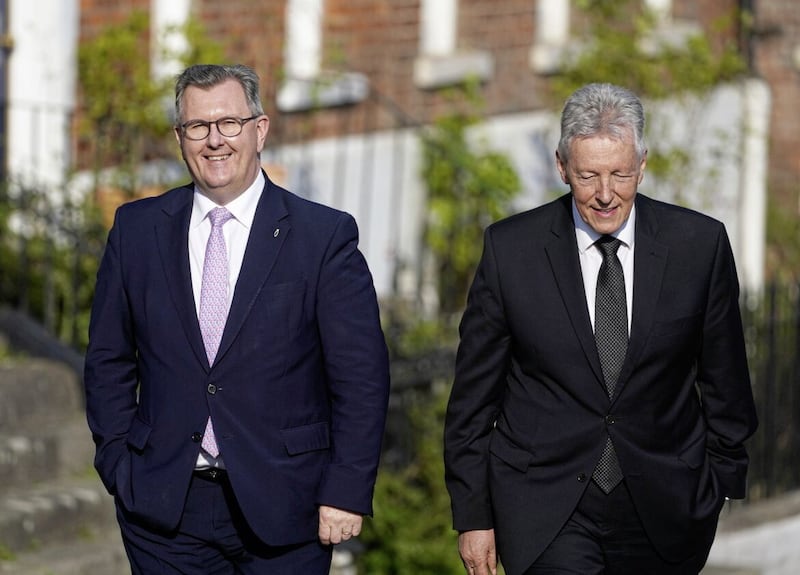THE DUP has always had a problem positioning itself, as a party that is much more socially conservative than the unionist electorate.
Peter Robinson sought to bridge the gap with a managerialist message of competence, pioneered in the 1980s at Castlereagh Borough Council. Like the old joke about Mussolini making the trains run on time, the DUP’s offer to voters was: "We may be religious fundamentalists, but we empty the bins on time."
Arlene Foster, not a religious fundamentalist, was expected to develop this brand, until RHI intervened. Sir Jeffrey Donaldson has the same message. His conference address last month was safe to the point of blandness – a promise of better public services once devolution is restored.
Read more:
- Newton Emerson: Why can't Jeffrey Donaldson do the Stormont show for real?
- Newton Emerson: Council light shows are out of control
- Newton Emerson: What if Sinn Féin boycotted DUP's 'east-west council'?
But competence has become a much harder sell for the DUP, and not just because RHI and Brexit have wrecked whatever reputation it had.
As Stormont’s second-largest party it can no longer benefit from the perception of being in charge that attaches to the office of first minister. The DUP encouraged that perception, deepened it through the St Andrews Agreement, then coasted on it for years. This is not a trick that works from second place.
The other way to try bridging the gap is culture war populism – seeking out or stirring up controversies where voters feel the DUP is on their side, even if they do not usually share the party’s worldview.
Competence and culture war are incompatible messages that force a choice of direction. They cannot be combined because culture warriors on both sides ultimately come to despise managerialists as unprincipled centrists who believe in nothing.

The DUP has been wrestling with this choice since the 1980s. Thanks to the party’s transatlantic church connections, it was particularly aware of how the US religious right was inserting itself into mainstream conservative politics. Opposing what is now called wokeness and was then called political correctness had a potential to connect with more secular voters that intrigued some thinkers within the DUP.
For once, they were decades ahead of their time. Only an internet connection is required today to plug straight into US politics, so the English-speaking world is importing it wholesale. The DUP is hardly alone in being tempted. As the Tories face electoral disaster, they are increasingly torn between presenting Rishi Sunak as a competent managerialist or launching into ‘anti-woke’ culture wars.
Nor is the DUP unique in importing this to Northern Ireland. The 2020 Black Lives Matter protests in Belfast and Derry, and much of the reaction to them, were pure Americana. However, there is clearly more of a debate going on inside the DUP than Donaldson’s conference address suggested.
Read more:
- Has the DUP found its reverse gear?
- The orange and green zero-sum game has stopped our politics from working
- If our politicians can wine and dine together, why can't they work together?
Comments at a council meeting last week in Bangor were a straw in the wind. DUP councillor Colin Kennedy is widely reported to have ‘linked’ the gay community to support for Hamas. In reality, he was attempting to make a clunky point about some ultra-liberals supporting both gay rights and Hamas – a claim splattered across social media, mainly with American examples.
This illustrates the danger of modern culture war: it can be bizarrely irrelevant to voters who do not share the internet habits of politically active people. How many north Down ratepayers have been following this argument online? How many would switch their vote over it, even if they were following it?
A more serious culture war issue for the DUP is the new sex education curriculum for schools, enacted by the secretary of state in June. This has charged onto the transgender battleground, as well as invoking more venerable disputes about abortion and contraception.
The DUP is campaigning against the curriculum’s content and for enhanced opt-out rights. The party appears united behind the campaign, from Donaldson down, yet there are also signs the DUP has been carried along by a wave of parental concern and has been warily calculating how to exploit it, without getting swept away or raising expectations it cannot deliver. An opt-out for parents would get it out of being unable to change the curriculum.
In the DUP’s predicament of decline and relative powerlessness, the culture war route risks sending the message: "We may not be able to empty the bins, but we’re religious fundamentalists." It could be the party’s terminal strategic error.








